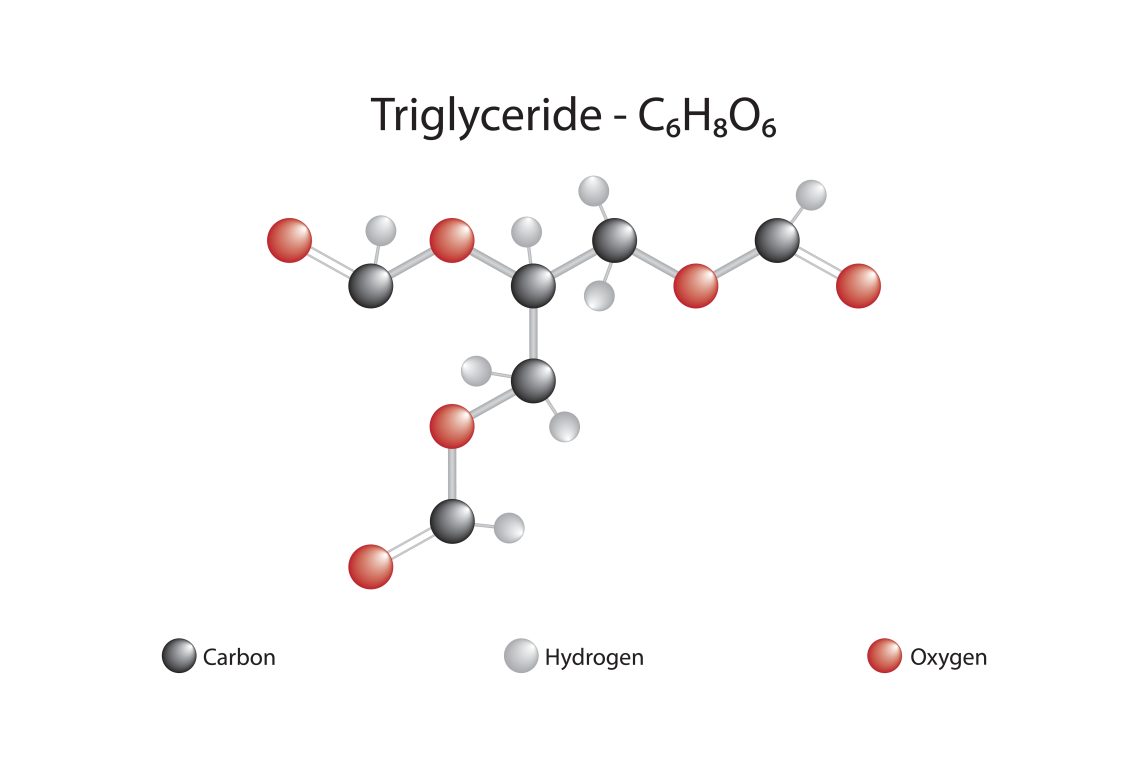What Are Triglycerides?
Triglycerides are a type of fat (lipid) found in your blood. When you eat, your body converts any calories it doesn’t need into triglycerides, which are stored in fat cells. Later, hormones release them for energy between meals.
But here’s the catch — consistently high levels of triglycerides (above 150 mg/dL) can harden arteries or thicken artery walls, increasing the risk of heart attack, stroke, and pancreatitis.
Why Triglycerides Matter for Your Heart?
High triglyceride levels often accompany other conditions that raise the risk of heart disease, including:
- High blood pressure
- High LDL (bad cholesterol)
- Low HDL (good cholesterol)
- Insulin resistance or type 2 diabetes
- Obesity
That’s why it’s vital to monitor and reduce elevated triglycerides as part of your heart-healthy routine.
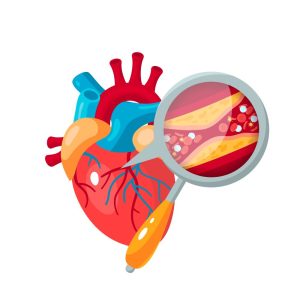
Common Causes of High Triglycerides
- Poor Diet — Excess sugar, refined carbs, and alcohol can spike triglyceride levels.
- Obesity and Inactivity — Extra fat tissue, especially around the abdomen, drives triglyceride production.
- Smoking — Yes, smoking increases triglycerides by promoting insulin resistance and inflammation.
- Medical Conditions — Diabetes, liver or kidney disease, and thyroid issues.
- Medications — Steroids, beta blockers, diuretics, and birth control pills may contribute.

Do Eggs Increase Triglycerides?
Contrary to popular belief, moderate egg consumption (especially boiled eggs) doesn’t directly increase triglycerides in healthy individuals. In fact, eggs are rich in protein and good fats that may help balance your lipid profile when eaten in moderation. However, avoid deep-fried preparations.
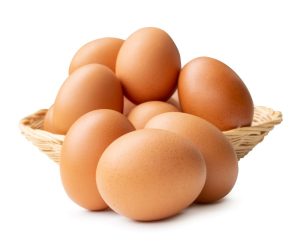
Is Ghee Good for Triglycerides?
Ghee, when consumed in small amounts, can be beneficial due to its rich source of healthy saturated fats and fat-soluble vitamins. But portion control is key. Too much ghee (or any fat) can contribute to elevated triglycerides. So, use ghee mindfully as part of a balanced triglycerides diet plan.
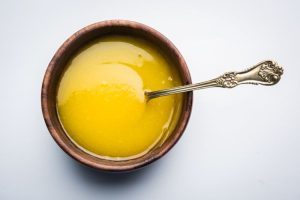
Home Remedies for High Triglycerides
Looking for natural solutions? Here are some effective home remedies to reduce triglycerides:
1. Fenugreek Seeds
Soak a teaspoon of fenugreek seeds overnight and drink it in the morning. It helps lower triglycerides and cholesterol.
2. Apple Cider Vinegar
Mix 1-2 teaspoons with warm water and drink before meals. Its acetic acid content helps regulate blood lipid levels.
3. Amla (Indian Gooseberry)
Rich in vitamin C and antioxidants, amla juice can reduce triglycerides and support liver function.
4. Omega-3 Sources
Flaxseeds, chia seeds, and walnuts are excellent plant-based omega-3 sources that can lower triglycerides naturally.
5. Garlic
Raw garlic or aged garlic extract has been shown to reduce triglycerides and cholesterol over time.
7-Day Diet to Lower Triglycerides
Here’s a sample 7-day triglycerides diet chart to help you manage your numbers:
Day 1
- Breakfast: Oats with chia seeds and berries
- Lunch: Quinoa salad with vegetables
- Dinner: Grilled fish with steamed broccoli
- Snack: Handful of almonds
Day 2
- Breakfast: Smoothie with spinach, banana, and flaxseeds
- Lunch: Brown rice, dal, and sautéed greens
- Dinner: Grilled tofu and carrot-beet salad
- Snack: Roasted chickpeas
Day 3
- Breakfast: Whole wheat toast with avocado
- Lunch: Mixed vegetable khichdi
- Dinner: Baked paneer with bell peppers
- Snack: Papaya slices
Day 4
- Breakfast: Boiled eggs and a fruit bowl
- Lunch: Millet roti, vegetable curry, and curd
- Dinner: Mung bean soup with veggies
- Snack: Handful of walnuts
Day 5
- Breakfast: Idli with coconut chutney (no oil tempering)
- Lunch: Rajma and brown rice
- Dinner: Stir-fried tofu with beans
- Snack: Cucumber slices with hummus
Day 6
- Breakfast: Smoothie bowl with oats and fruits
- Lunch: Grilled chicken breast and leafy salad
- Dinner: Lentil soup and steamed vegetables
- Snack: Dates and peanuts
Day 7
- Breakfast: Sprout salad and a boiled egg
- Lunch: Vegetable sambar and millet dosa
- Dinner: Palak paneer with roti
- Snack: Amla candy or buttermilk
This triglycerides diet plan is low in refined carbs, sugars, and trans fats — all of which are culprits in high triglyceride levels.
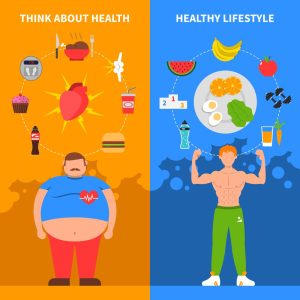
Triglycerides Control Medicine
In cases where lifestyle changes and home remedies aren’t enough, doctors may prescribe triglycerides control medicine such as:
- Fibrates (e.g., fenofibrate)
- Niacin (vitamin B3)
- Omega-3 fatty acid supplements
- Statins (especially if LDL is also high)
However, these should only be taken under medical supervision.

Lifestyle Tips to Lower Triglycerides
Here are a few powerful habits that can help:
Stay Active
Aim for 30 minutes of moderate exercise (like brisk walking, cycling, or yoga) at least 5 days a week.
Cut Down on Sugar
Refined sugars and sugary beverages spike insulin, leading to fat buildup in the liver and bloodstream.
Limit Alcohol
Even small amounts of alcohol can dramatically raise triglyceride levels in some people.
Quit Smoking
We’ve answered this earlier — smoking increases triglycerides and damages your arteries. Quitting smoking improves your lipid profile and reduces cardiovascular risks.
Manage Stress
Chronic stress can cause hormonal imbalances that affect fat metabolism. Try breathing exercises, meditation, or nature walks.

Triglycerides test
A lipid profile blood test can measure triglycerides, cholesterol, and other fat markers. It’s advised to fast for 9–12 hours before testing for accurate results. Adults over 20 should test every 4–6 years — more frequently if you have risk factors like obesity, diabetes, or a family history of heart disease.
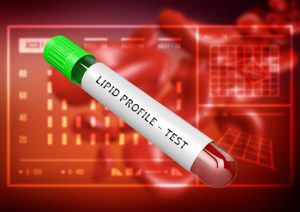
Lipid profile test
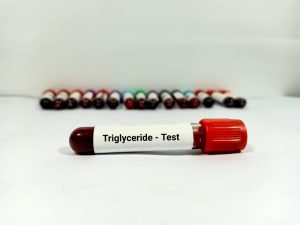
Conclusion:
High triglycerides are a warning sign — but also a reversible risk factor. Whether you’re exploring home remedies for high triglyceride, a structured 7-day diet to lower triglycerides, or evaluating triglycerides control medicine, the goal is the same: protect your heart and enhance your overall wellness.
Through balanced nutrition, regular activity, and consistent checkups, you can reclaim control over your health — and your heart will thank you for it.
FAQ’S
1. Can high triglycerides lead to physical symptoms?
In most cases, high triglycerides don’t cause direct symptoms. However, extremely elevated levels can increase the risk of pancreatitis, which may lead to abdominal pain. More commonly, high triglycerides contribute silently to heart disease over time, often going unnoticed until complications arise.
2. How are triglycerides different from cholesterol?
Though both are fats found in your blood, they serve different roles. Triglycerides store extra calories for energy, while cholesterol helps build cell membranes and hormones. Managing both is essential to reduce your risk of heart-related conditions.
3. How long does it take to lower triglyceride levels naturally?
With the right combination of a healthy diet, regular exercise, and lifestyle changes, triglyceride levels can start to improve within 4 to 8 weeks. However, consistency is key, and follow-up tests are recommended to monitor progress.
4. Should I avoid fruits completely if I have high triglycerides?
No, fruits are a valuable source of vitamins and fiber. However, it’s wise to limit high-sugar fruits like mangoes and grapes. Instead, choose low-glycemic options like berries, apples, and guavas to support stable triglyceride levels.
5. Is skipping meals a good way to reduce triglycerides?
Skipping meals is not advisable as it may lead to overeating later and disrupt blood sugar balance. Instead, aim for regular, balanced meals that are rich in fiber, protein, and healthy fats to naturally manage triglycerides.

